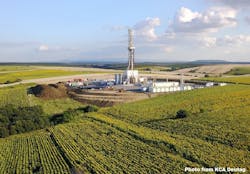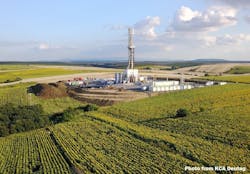Valeura Energy launches Thrace basin unconventional play concept
Canadian Valeura Energy Inc. and partner Statoil ASA are planning a three-well delineation drilling and testing program commencing in this year’s third quarter on the Banarli and West Thrace licenses in northwest Turkey’s Thrace basin, which is west of Istanbul and extends to the borders of Greece and Bulgaria.
The Yamalik-1 discovery on Barnarli license is undergoing a tie-in to Valeura’s gas production network for further testing and long-term production and sales. Design work is under way for the production facilities and gathering pipeline at an anticipated cost of $3 million. First sales from Yamalik-1 are targeted for this year’s second quarter.
Yamalik-1 was drilled to 4,196 m and hydraulically fractured and production tested in fourth-quarter 2017. The well discovered a 1,300-m natural gas and condensate column in overpressured reservoirs below 2,900 m in the Tertiary Teslimkoy and Kesan formations. In December, the company completed four production tests from eight frac stages in the Kesan formation, yielding 24-hr aggregate test rate of 2.9 MMcfd.
Valeura Energy has participated in numerous drilling programs throughout the southern Thrace basin since 2013 and play types have ranged from conventional shallow gas exploration prospects in the overlying Danismen and Osmancik formations to the tighter gas prospects in the Mezardere and underlying Teslimkoy and Kesan formations (OGJ Online, Mar. 22, 2016). The company’s basin-centered gas concept is targeting the pervasive overpressured unconventional gas resources in the synclinal parts of the Thrace basin.
Yamalik-1 was the first deep exploration well in the project, and was drilled under a farm-in agreement giving Statoil 50% interest in formations deeper than 2,500 m within the Banarli and West Thrace licenses. Valeura holds 50% in the deep formations in the Banarli license and 31.5% in the deep formations in the West Thrace. Pinnacle Turkey Inc. holds the remaining 18.5% interest in West Thrace.
Dallas-based DeGolyer & MacNaughton (D&M) reported on Feb. 6 that Valeura Energy’s estimated working interest unrisked mean resources were 10.1 tcf, which includes 236 million bbl of condensate. Working interest risked mean prospective resource are an estimated 5.2 tcf of gas, 165 million bbl of which is condensate. Valeura’s Chief Executive Officer Sean Guest said the independent evaluation supported the company’s thesis of a “large unconventional, basin-centered gas-condensate resource,” but also acknowledged the exploration is in an early phase.
D&M’s broad range of recoverable gas from 3.2 tcf to more than 20 tcf is a function of uncertainty related to limited stimulation and production testing from the overpressured Teslimkoy and Kesan formations in the Thrace basin.
The firm has assigned a 74% chance of development for the gas prospect based on economic field size and the application of existing fracing technology. Follow up well depths are estimated to be about 5,000 m and therefore not excessive in cost. The Yamalik-1 well, drilled to 4,196 m, was limited by rig capability but the base of the well was still in gas-bearing sands that were successfully flow tested, Valeura said. The company’s existing infrastructure and customer base is capable of handling more than 35 MMcfd compared with current sales through the system of less than 10 MMcfd.
Turkey also provides a captive market with 99% of its current gas demand supplied by imports, which could be an opportunity for domestic gas producers.
Contact Tayvis Dunnahoe at [email protected].

